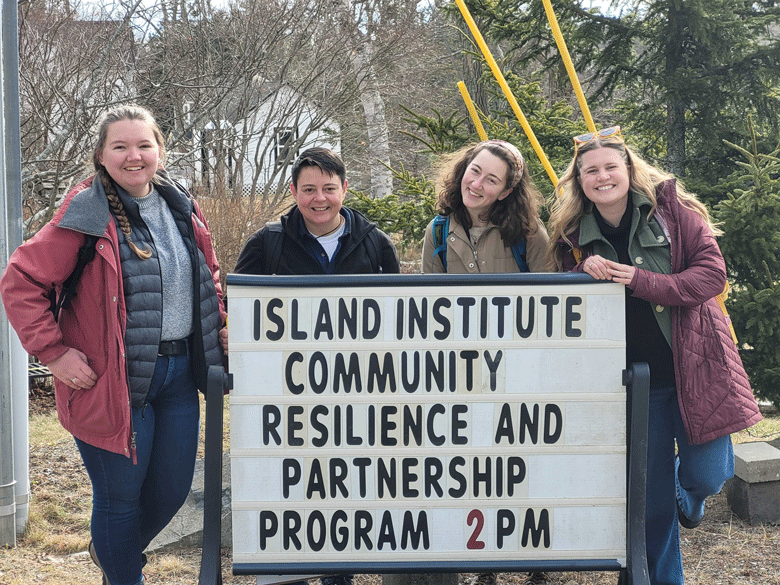I was on Great Cranberry Island for a community event recently and encountered a sight that will not be easily forgotten. As I stood on the dock awaiting the mailboat back to mainland, I looked to the west and saw several gravestones on a grassy enclave that were dangerously close to a 2-3 foot drop down to the lapping water.
The cemetery was falling into the ocean.
Threats like this are common on our coast as we continue to see and feel the impacts of a changing climate. In the face of these changes, communities are called to be “resilient,” or to prepare to withstand and bounce back from these difficult events. But there’s much to be understood about the “how” of this work.
Chebeague Island has started to consider how more common extreme droughts and flooding may threaten to inundate water tables.
As I near my two-year anniversary working at the Island Institute, I thought I’d share some of the resilience demonstrations I’ve encountered during my time.
While all our island communities may not have cemeteries falling into the ocean, erosion is a common issue along the coast. Recently, I learned of the work Long Island in Casco Bay is doing to address an erosion problem—the slow loss of one of the community’s beloved public sand beaches. Fowler’s Beach is pocketed on the west end of the island and is made up of sand dune systems that have been dramatically worn away by more extreme and common storms in recent years.

The effort, primarily driven by the Long Island Conservation Association, will aim to take measures to build up and better support the system so it can withstand storms. This will include planting dune grass seedlings, reconfiguring beach paths, and strategically installing new fencing.
Just north in Casco Bay, Chebeague Island has started to consider how more common extreme droughts and flooding may threaten to inundate water tables. On Chebeague, the community will soon begin work on a study to evaluate climate-related impacts on the town’s groundwater supply.
Using funding from the state’s Community Resilience Partnership, the project will assess the sustainability of the community’s aquifer. That work includes re-establishing a long-term monitoring program to identify adverse trends in the water levels and water quality, and beginning field and laboratory tests to get a snapshot of aquifer water quality and identify problem areas.
Moving up the coast to Penobscot Bay, Vinalhaven Island has embarked on a project that aims to collect local, real-time data on both tidal and weather conditions. The project, funding in part through the Island Institute’s ShoreUp grant program, aims to build a long-term database on high tides for the island in the face of sea level rise. The community’s sea level rise committee has spearheaded this initiative to provide data to ferry captains who serve the community, along with other mariners.
This monitoring station is likely, over time, to be followed by the installation of tide and/or weather sensors at additional vulnerable locations on the island.
Long term, the committee aims to use the data collected to help it understand the impact of tides and weather on vulnerable areas to inform responsible environmental decisions.
Coastal communities are facing greater challenges due to climate change and are being called to be resilient and prepare for difficult circumstances. While the practical application of this term sometimes may be unclear, coastal communities have demonstrated innovative solutions to climate challenges.
It remains to be seen how Great Cranberry Island will tackle its resilience problems, but the examples from other communities suggest it will find its own strategies. By sharing these examples, we can inspire and encourage other communities to embrace resilience and face the challenges ahead with hope and creativity.
Abby Roche is a community development officer with the Island Institute, publisher of The Working Waterfront, focusing on sea level rise and community leadership. She may be reached at aroche@islandinstitute.org.





